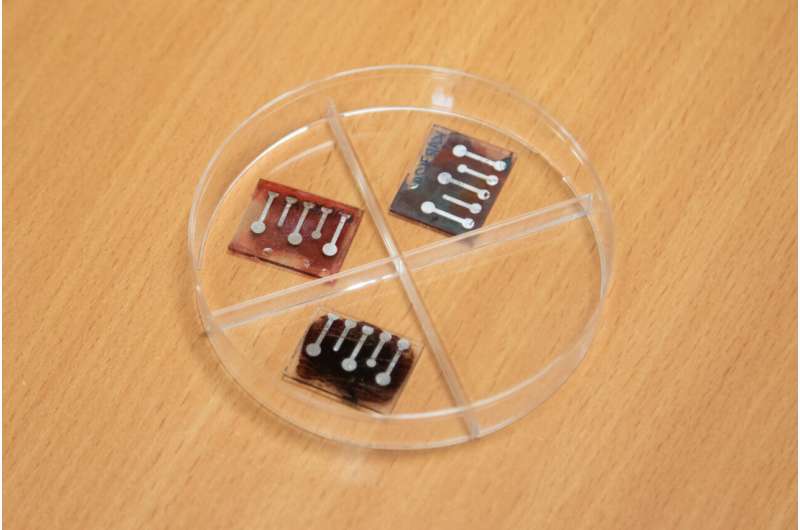New material proposed for perovskite solar cells

A new type of material for solar cells was proposed by specialists of the Ural Federal University (UrFU) and the Institute of Organic Synthesis of the Ural Branch of the Russian Academy of Sciences together with their colleagues. The compounds found will significantly reduce the cost of solar cell production. The article was published in the New Journal of Chemistry.
Perovskite solar cells (PSCs) are a promising alternative to the familiar silicon cells, providing the same amount of energy with 180 times less material thickness. Their production technology is much simpler and cheaper than that of silicon cells. The problem with PSCs is its lack of stability. One of the most effective solutions today, the specialists explained, is the selection of new materials that ensure the transport of charge carriers after it is obtained in the perovskite layer itself.
Scientists from the UrFU and the UB RAS have proposed a new type of material for transporting electrons in PSCs, which has a number of advantages. According to the authors, with the new material they were able to achieve solar energy conversion efficiency of 12%, which is comparable with the average performance of market counterparts.
“The family of molecules we found carries electrons in PSCs slightly worse than the fullerenes used today, but they are about twice as cheap, much easier to produce, and have a number of other technological advantages,” says Gennady Rusinov, associate professor at the Department of Organic Synthesis Technology of UrFU.
Although fullerenes, according to scientists, are the most sought-after electron-transport material for PSCs, they have problems with morphological stability and low light absorption, as well as great difficulty in modifying electronic properties. The costs of synthesis and purification of fullerenes in some cases make their application economically inefficient.
“Our molecules are devoid of the main drawbacks of fullerenes, and their synthesis is very simple, even in large quantities. The optical, electrochemical and electronic properties of our molecules are easily modified. In addition, they are dipoles, which opens up a number of possibilities for improving PSCs,” said Gennady Rusinov.
Researchers from the Ural Federal University and the Institute of Cosmophysical Research of the Ural Branch of the Russian Academy of Sciences proposed a complete synthesis technique for the new molecules and also studied their thermal stability, electronic and optical properties.
High efficiency, stable and scalable perovskite solar cells created with vacuum deposition apparatus
A. S. Steparuk et al, Thieno[3,2-b]indole–benzo(b)thieno[2,3-d]thiophen-3(2H)-one-based D–π–A molecules as electron transport materials for perovskite solar cells, New Journal of Chemistry (2022). DOI: 10.1039/D2NJ02202H
Citation:
New material proposed for perovskite solar cells (2022, October 27)
retrieved 27 October 2022
from https://phys.org/news/2022-10-material-perovskite-solar-cells.html
This document is subject to copyright. Apart from any fair dealing for the purpose of private study or research, no
part may be reproduced without the written permission. The content is provided for information purposes only.
For all the latest Science News Click Here
For the latest news and updates, follow us on Google News.

